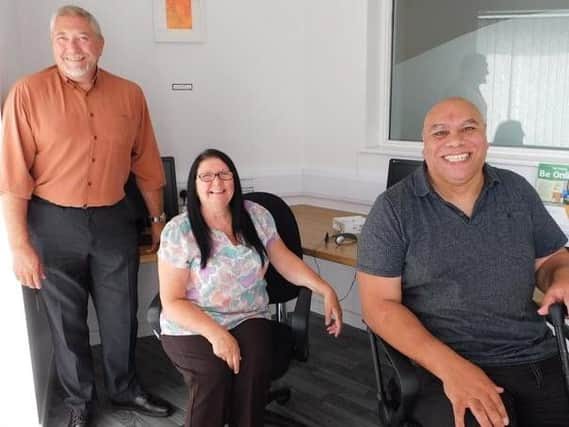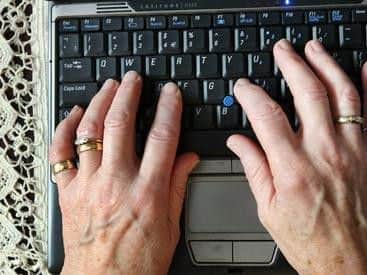'I was frightened of computers': Silver surfers on Fylde coast join digital revolution with help to get online


We are the digital champions, my friends.
From paying bills to switching utilities suppliers, keeping in touch with friends or booking a doctor’s appointment, modern life is increasingly spent online.
The latest Office of National Statistics survey – out this month – reveals that nine in every 10 households has an internet connection.


Advertisement
Hide AdAdvertisement
Hide AdDaily internet use has more than doubled since 2006, older adults show the largest increase in online shopping over the last decade, and almost eight out of 10 adults access the internet ‘on the go’ with devices like smartphones, laptops, and tablets.
But there’s still a generational gap in computer confidence levels between younger and older workers.
That’s something Blackpool-based charity Disability First hopes to remedy. It is running ReachIT Digital Inclusion courses under the Building Better Opportunities programme funded by the National Lottery and European Social Fund.
The free courses, which run until the end of next year, are aimed at people over 40 who are unemployed or classed as ‘economically inactive’, which could mean they are on benefits, disabled or retired.
Digital exclusion
Advertisement
Hide AdAdvertisement
Hide AdDisability First CEO Alan Reid knows many disabled people, particularly older people, feel on the fringe of mainstream society.
He explains: “Digital exclusion and social exclusion are closely related. Both lead to inequality of opportunity.”
That could be the opportunity to seek and get work, save money, switch utilities suppliers, find better value house insurance, or shop for deals.
It could be the opportunity to have your say via online surveys on NHS changes – or book a doctor’s appointment and order prescriptions online.
Advertisement
Hide AdAdvertisement
Hide AdEven those who own and use devices like PCs, laptops and smartphones are not necessarily computer literate.
The ONS reveals, for instance, that 24 per cent of smartphone users have no idea whether they have any security installed.
While 89 per cent of households in the North West now have an internet connection, not everybody living in them will make use of it.
Take Lionel Williams, 53, of Blackpool. A year ago, Lionel wouldn’t have gone near a computer mouse. Now he’s a digital champion, out to teach others.
'I was frightened'
Advertisement
Hide AdAdvertisement
Hide AdHe’s completed the Disability First course not just in computer literacy – but finding the skills to help others.
Last year he had to ask his son to “go on the computer” for him.
“I didn’t really like to ask – but I didn’t dare do it myself,” he admits. “I was frightened of computers.”
He’s since switched utilities suppliers online – and is now looking for work.
He is one of four digital champions trained by the charity.
Advertisement
Hide AdAdvertisement
Hide Ad“It boosts your confidence,” says Lionel. “I found the online stuff hard at first. But now I know where to look, how to do so safely, guard against scammers.
“Too many people give away too much stuff online about themselves.”
Disability First is one of around 20 organisations across Lancashire involved in the scheme. A big plus for the charity, based within the Centre for independent Living on Whitegate Drive, is helping others to access health services on line.
Digital engagement officer Martin Croysdill says: “Most doctors have gone digital and you can order prescriptions and book appointments online. Part of our training shows people how to register and use those services.
Advertisement
Hide AdAdvertisement
Hide Ad“We are out to create a network of digital champions to take the lessons into their own communities.
“Lots of people play games or update social media online when they could be doing so much more.
“Tell people you are going to teach them how to use computers and they don’t want to know. Tell them you are going to help them save money and it’s a different matter.”
New digital champion Marilyn Hardman is keen to help those who struggle with technology because of other challenges.
Advertisement
Hide AdAdvertisement
Hide Ad“We can get around anything – super-size text, change the colours, use a trackball mouse if you have arthritis, or a touch screen.
“We can access keyboards for the visually impaired. Once you put the training into practice you see the difference it makes, the benefits it brings.”
She’s since bought her own laptop online, using her daughter’s phone, and set it up herself.
“I’ve done loads, shopped on line, changed utilities, saved so much money. When I couldn’t get out because of my back, I did my Christmas shopping online, delivered to the door, and the food shop.
Advertisement
Hide AdAdvertisement
Hide Ad“You can do jigsaws on line, find knitting patterns, join online clubs, find places that are accessible and so on.
“I love art, so I visit art galleries and museums online. It’s wonderful. I want to show people there is so much more to it than shopping or banking or social media.”
Find out more
For more information about the courses, call Martin Croysdill on 07791 563107.
Alternatively, email [email protected] , visit the centre at 259 Whitegate Drive or call (01253) 472202.